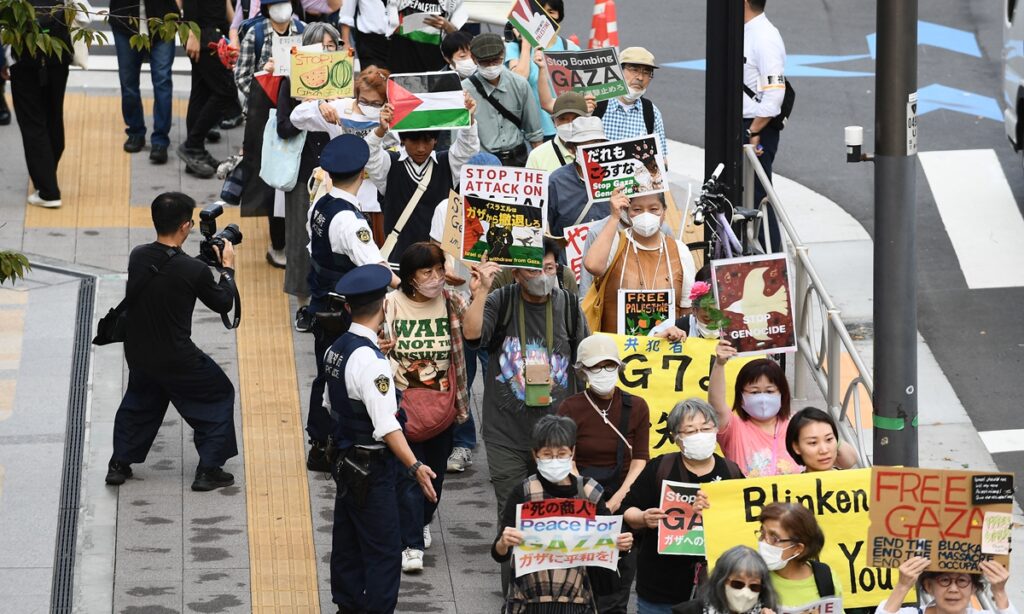Foreign ministers from Group of Seven (G7) nations met in Tokyo on Tuesday in an attempt to find common ground on the Palestine-Israel conflict. However, observers noted that given the growing divergence among member states over the ongoing conflict, the bloc is unlikely to be able to effectively advocate for a cease-fire, which will further underscore the bloc’s diminishing influence and its inability to stop the humanitarian crisis in Gaza.
As the chair country, Japan is hosting the second G7 foreign ministers’ meeting this year in the Minato area of Tokyo on Tuesday and Wednesday. According to Japanese media, officials will exchange views on several major ongoing issues related to international security, especially the Palestine-Israel war and the Ukraine crisis.
Japanese media reported that G7 ministers are scheduled to compile an outcome document on Wednesday, in which they are expected to agree on the necessity of “a pause” in the conflict to deliver essential supplies to civilians in Gaza. However, the wording may be addressed in general terms given the widening divergences.
On October 22, six of the G7 countries, except for Japan, issued a statement siding with Israel. However, as Israel’s military operations in Gaza have escalated the humanitarian crisis and even crossed moral boundaries, some members of the group have found it increasingly difficult to tolerate Israel’s actions, which has resulted in a growing divide within the G7 among the US and other nations, Yang Xiyu, a senior research fellow at the China Institute of International Studies, told the Global Times.
For example, Japanese Prime Minister Fumio Kishida has not visited Israel to show support, although last week, Japan’s Foreign Minister Yoko Kamikawa met with Israeli and Palestinian foreign ministers during a trip to the region. The Japanese minister also pledged $65 million in humanitarian aid and support to Gaza, according to media reports.
In handling the Palestine-Israel issue, current G7 chair Japan has adopted a more circumspect stance than its prior strategy of closely following the US, Yang noted, adding that in contrast to the significant influence of Jewish Americans on US politics, Japan is less affected by Jewish concerns and has not been as deeply involved in Middle East affairs as has the US.
Yang said that a more essential reason is Japan’s heavy reliance on Middle Eastern oil, which forces it to adopt a more moderate approach than the US and refrain from taking sides between Israel and the Arab world.
Apart from Japan, the US and EU’s differences on the Palestine issue have become increasingly apparent in recent weeks. Liu Zhongmin, a professor at the Middle East Studies Institute of Shanghai International Studies University, noted that many Europeans were more sympathetic to the Palestinians before the current crisis. Meanwhile, the EU is becoming more concerned about the war’s spillover effects, such the potential for a refugee catastrophe.
Even while the governments of several EU nations have expressed support to Israel, public anger at Israel’s retaliatory measures in Gaza has been increasing, which has resulted in a spike in violence against Jewish communities and escalating conflicts between different groups, Liu said.
Within the EU, there is a growing and alarming rift between pro-Palestine and pro-Israel groups, as well as between Jewish and Muslim groups, the expert noted.
There have been large demonstrations in support of Palestinians across Europe during Israel’s ongoing bombardment of Gaza. Thousands of pro-Palestinian demonstrators demanded a cease-fire on Saturday in Berlin, Paris and London, according to the media.
Some analysts noted that the US and the EU also differ in how much attention they place on the war in the Middle East and in Ukraine.
The G7 foreign ministers are also reportedly to discuss the Ukraine crisis to demonstrate its support for Ukraine will not waver due to the conflict in the Middle East, Reuters reported.
Yang noted that it is difficult to say which conflict is more vital, but the EU and the US have different focus – the EU is more concerned about whether the Ukraine crisis will expand or be prolonged, while the US may pay more attention to the Middle East since the conflict in the Middle East may force it to modify its global strategy again.
Yang also said the EU was equally concerned about how the conflict in the Middle East would impact them if it is further escalated.
According to Liu, if the humanitarian catastrophe in Gaza continues to worsen, the US and Israel will become even more isolated on the global stage. The divide between the US and its partners in the G7 and the rest of the world will also widen. On October 27, the 193-member UN General Assembly passed a resolution drafted by a group of 22 Arab countries that called for a cease-fire by a margin of 121 to 14, with 44 countries abstaining.
Among the 14 countries that voted against the cease-fire were Israel, the US, Fiji, Guatemala, the Marshall Islands, Micronesia, Nauru, Papua New Guinea, Paraguay and Tonga. Japan also abstained from the UN resolution. None of the other G7 countries voted with the US.
Waning influence of G7
As of press time on Tuesday, Palestinian health authorities said the death toll from Israeli strikes had exceeded 10,000 and UN Secretary General Antonio Guterres said on Monday that Gaza is becoming a “graveyard for children.”
Despite global call, the US has not abandoned its rejection of the cease-fire proposal. US President Joe Biden reaffirmed the US’ “steadfast” support for Israel on Monday when speaking with Israeli Prime Minister Benjamin Netanyahu.
Liu said there is little chance that the G7 foreign ministers’ meeting would produce a workable solution to halt the worsening situation in Gaza. The bloc’s final statement on the war between Israel and Palestine would reiterate US rhetoric about a “pause,” which is not a solution to the Palestine issue.
The G7’s discussion over the Palestine issue is more to demonstrate their presence and to lessen the growing pressure globally, Liu said, noting that countries that ought to have stopped Israel have chosen to back off as further tragedies in Gaza are unfolding, highlighting the G7’s marginalization in global governance.
In addition to the crises in the Middle East and Ukraine, the G7 foreign ministers will discuss “China’s increasing maritime activities.” Some Western media claimed that the two nations are utilizing the current conflict to bolster their reputations as the champions of the developing world.
In the midst of a severe humanitarian crisis and escalating war, some countries are still prioritizing their own geopolitical interests and focusing on geopolitical gains, disregarding the risks of war escalation and humanitarian disasters, Yang said.
Yang urged more countries to cooperate in pushing for a cease-fire, saying that every nation that upholds justice and morality should concentrate on finding a solution to the current conflicts in the world, rather than encouraging new hostilities.
(Global Times)




